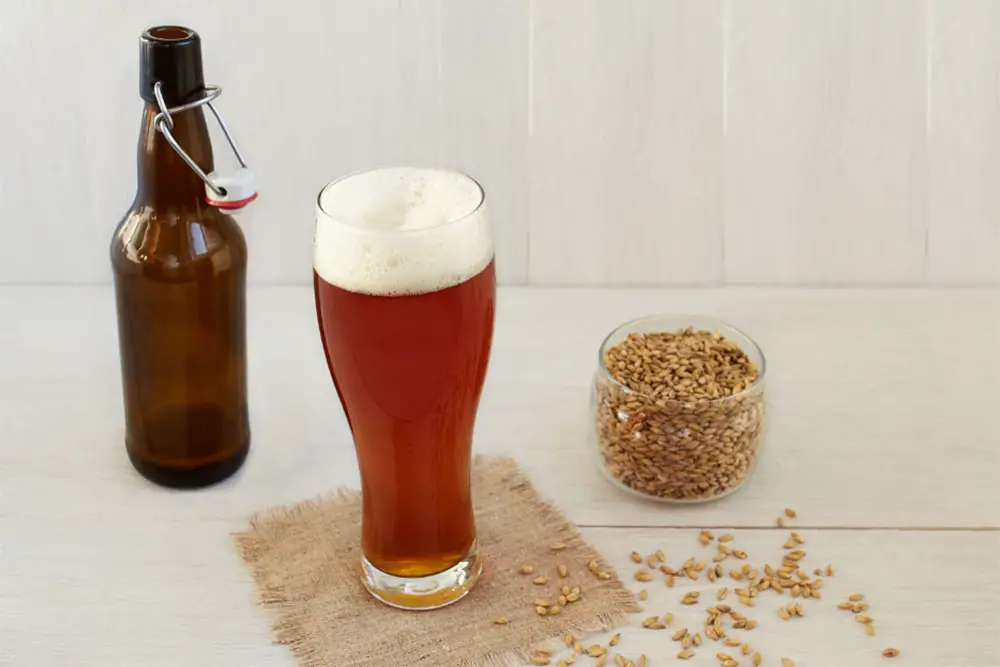When you think about yeast, the first thing that you think of probably isn’t alcohol. In fact, the first thing that you probably think of is bread. Yeast is an active ingredient in most breads, included so that they will rise when they are cooked.
But, what you might not know is that yeast is also an active ingredient in lots of different types of alcohol. It is not added in for flavor, but it is an essential ingredient when making most types of alcohol.
In fact, you might be hard-pressed to find an alcohol that doesn’t include yeast in the fermentation process.

BEER DROP: Boxes of beer from Award-winning microbreweries → Join The Club
Although they can be difficult to find, there are some types of alcohol that you can produce without adding additional yeast. But, there is no way of preventing yeast from growing in the alcohol as it is a micro fungus which is in the air all around us, so it will naturally join the alcohol as part of the fermentation process.
So, yes, you can make alcohol without adding yeast in the production process. But, there is no guaranteeing that yeast will not join the alcohol during the fermentation process. Now, let’s take a look at how you can make alcohol without using yeast.
Can You Make Alcohol Without Yeast?
Yes, alcohol can be made without yeast, but it’s nearly impossible to make any kind of alcohol that doesn’t contain any yeast from the natural environment.
There are some types of alcohol which you will not be able to make without including yeast, for example, beer is very dependent on yeast and any attempts to be made without it will be unsuccessful.
You might find this piece of information slightly confusing because some beers will be advertised as ‘yeast free’. So, how can these products be beer free if it is very difficult to produce them without using yeast? Well, the answer is pretty simple.
As we said earlier, even if you do not actively add yeast in the production process, it will usually find its way into the alcohol. This is because yeast is a micro fungus, and it is in the air, so at some point it will develop in the alcohol.
Most ‘yeast free’ beers will not actually be yeast free, but they will be produced without actively acting yeast in the process. The only yeast that you will find in this alcohol, will be the yeast that has naturally occurred.
If you are not familiar with the fermentation process of alcohol, then you might not be aware of the very important role that yeast plays in this. With that in mind, let’s take a look at what yeast does in alcohol.
What Does Yeast Do In Alcohol?
To really understand what yeast does for alcohol, you really need to understand what yeast is and what its properties are. Yeast is a micro-organism that belongs to the fungal family, so it is closely related to other foods, such as mushrooms.
If you ask most seasoned alcohol makers, they will tell you that yeast is one of the key ingredients in the production of alcohol because it is what triggers the fermentation process.
Alcohol is produced by converting sugar during the fermentation process. This is able to happen because of the inclusion of yeast.
During the fermentation process, the ingredients are cut off from oxygen, and this is what triggers the chemical reaction to convert the sugar into alcohol. This chemical reaction is triggered by the inclusion of yeast, so without yeast, this will not happen.
At current, there are no known substitutes for yeast, and this is why it is almost impossible to produce some types of alcohol without including yeast.
So, at current, if you want to produce alcohol without including yeast, this is only achievable if you don’t add any additional yeast ingredients to the mixture.
Generally, if you want to increase the alcohol content of your drink, you do this by adding more sugar to the yeast. But, we have said that there are some types of alcohol which can be produced without using yeast.
So, what are these alcohols? And how do you do it? Let’s take a look.

What Alcohol Can Be Made Without Yeast?
If you do want to attempt making alcohol without yeast, then you will be limited with what you can try to make. As we have said, some alcohols, such as beer, are heavily reliant on yeast, and so it is pretty much impossible to make these types of alcohol without using yeast in some shape or form.
But, some types of alcohol are perfectly okay to make without adding any artificial yeast to the mixture.
Surprisingly, the types of alcohol that are suitable to be made without adding any yeast are the types of alcohol that actually have a rather high alcohol content. Beers tend to come with a low percentage of alcohol, which might lead you to think that they will be better suited to be made without yeast.
Of course, we know that this isn’t the case. Instead, high alcohol drinks such as wines and spirits are much better if you want to exclude artificial yeast from the production process.
If you are new to home brewing, and want to attempt producing something without using yeast, then wine is probably your best bet. This is because wine is a type of alcohol that has a very high fruit content.
Fruit naturally comes with a high sugar content, and because of this, the fruit that is used in wine is actually able to ferment naturally. This process is also sometimes referred to as ‘wild fermentation’.
The reason it is possible to create wine without using any artificial yeast lies in the fact that people traditionally used to make wine without adding yeast.
Wine is a very historic drink, and it has been around long before the realization of artificial yeast. For centuries, people made wine using just natural yeast, and so it is perfectly feasible to do this today.
If you are reading this, you might be wondering why wine can be successfully made without yeast, when other types of alcohol cannot. This is because yeast is naturally found on the outside of grapes, and grapes are often the primary ingredient in wine.
This natural yeast has been on the outside of grapes for centuries, and this is why it is possible to make wine without adding artificial yeast.
Yeast Substitutes
We said earlier that there are currently no known substitutes for yeast, but this isn’t completely true. When we said that, we meant that there are no perfect substitutes for processed yeast.
But, if you want a substitute that does a similar job to yeast, there are some options available to you. These alternatives are generally foods that are naturally high in yeast, so you can get the yeast into your alcohol without actively adding artificial yeast.
So, with no further ado, let’s take a look at the different substitutes that you could use for yeast.
Grapes (And Other Types Of Fruit)
It seems only fair that we begin with the option that we mentioned earlier, and that is grapes.
We spoke in depth about why wine is a feasible alcohol type to make without artificial yeast, and this is all because of the natural yeast that is found on grapes. This natural yeast not only occurs naturally in grapes, but can also be found in other types of fruit.
The key to accessing the natural yeast in these fruits is to smash them up. Once this has occurred, the fruit is covered with an airtight container. The yeast that is found on the outside of these fruits can then get to work, naturally fermenting the fruit without needing to add any additional yeast.
As we have said, this process of fermentation is most commonly used when making wine, and this is mainly because wine tends to have a high fruit content.
As this process uses natural yeast, it ensures that your wine is specific to the area, and this is why you often find wines named after the city or area where they were made.
Bread
We have said that it is almost impossible to make beer without using yeast. We said almost, because you can actually produce beer using bread as the yeast source. This might seem like a strange concept, but it is actually a feasible option, and one that is very popular.
In order to do this, you will need fresh bread to ensure that the yeast is still alive and active. Then the process is fairly similar to the usual process of fermenting beer, you just use bread instead of artificial yeast.
In fact, some people prefer to use bread with artificial yeast because it can aid the fermentation process and make it easier.
Rice Bran
Finally, you might want to consider using rice bran to ferment alcohol. This is the cheapest alternative, and it is fairly simple because you simply replace your artificial yeast for rice bran.
Rice bran has the potential to complete ethanol fermentation, just like yeast, and because it has a small size and shape, it works incredibly similarly. So, if you fancy making alcohol, but don’t want to use any yeast, then rice bran is a great choice.
Summary
In short, yes, you can make alcohol without yeast. Well, you can make alcohol without artificial yeast. It is impossible to make any alcohol without yeast because this is a naturally occurring microorganism.
But, it is possible to make alcohol without adding any artificial yeast, and we have shown you how to do this in the guide above.
